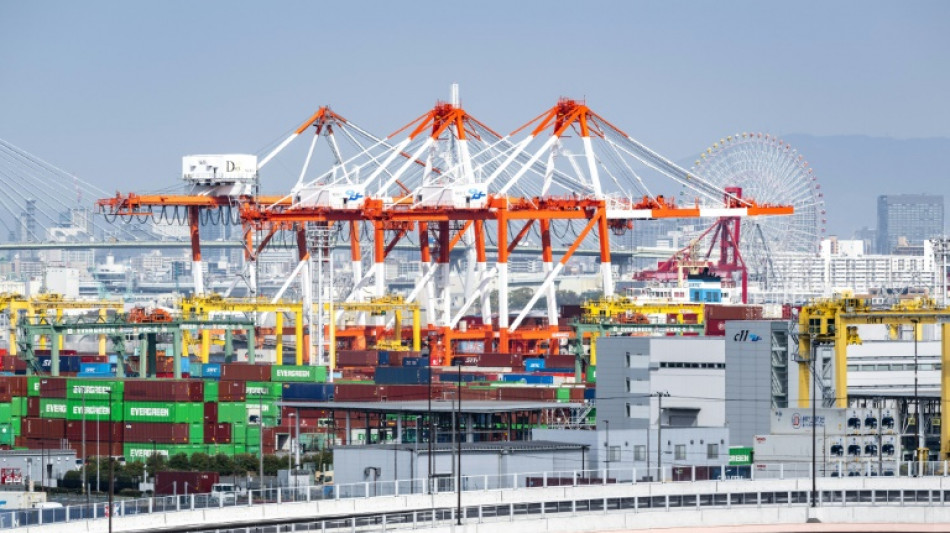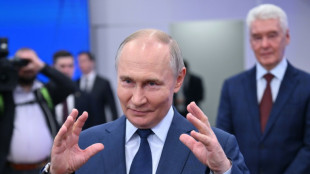

Trump's tariff exemptions give markets relief, but uncertainty dominates
US tariff exemptions for electronics prompted market rallies Monday from Asia to Wall Street, but uncertainty dominated in a global trade war that Chinese leader Xi Jinping warned can have "no winner."
Wall Street was buoyant, with the Dow Jones index rising one percent shortly after the opening and the S&P 500 up 1.45 percent. This followed boosts on Asian and European markets.
Investors are relieved at the apparent easing of pressure in President Donald Trump's wide-ranging but often chaotic attempt to reorder the world economy by using tariffs to force manufacturers to relocate to the United States.
Tit-for-tat exchanges have seen US levies imposed on China this year rise to 145 percent, and Beijing setting a retaliatory 125 percent barrier on US imports.
The electronics tariff reprieve, US officials said late Friday, means exemptions from the latest duties against China for a range of high-end tech goods such as smartphones, semiconductors and computers.
But Trump suggested Sunday that the exemption would be only temporary and that he still planned to put barriers up on imported semiconductors and much else.
"NOBODY is getting 'off the hook' for the unfair Trade Balances," Trump blasted on his Truth Social platform. "We are taking a look at Semiconductors and THE WHOLE ELECTRONICS SUPPLY CHAIN."
On Monday, in remarks at the White House, Trump once again pivoted to suggesting possible compromise, saying he was "looking at something to help some of the car companies" hit by his 25 percent tariff on all auto imports.
"I don't want to hurt anybody," he said.
The Chinese commerce ministry said Friday's move was only "a small step" and all tariffs should be cancelled.
China's Xi warned Monday -- as he kicked off a Southeast Asia tour with a visit to Vietnam -- that protectionism "will lead nowhere" and a trade war would "produce no winner."
- Short-lived relief? -
Trump initially unveiled huge tariffs on countries around the world on April 2.
He then made an about-face a week later when he said only China would face the heaviest duties, while other countries got a global 10 percent tariff for a 90-day period.
The trade war is raising fears of an economic downturn as the dollar tumbles and investors dump US government bonds, normally considered a safe haven investment.
And the latest wrangling over high-tech products -- an area where China is a powerhouse -- illustrates the uncertainty plaguing investors.
Washington's new exemptions will benefit US tech companies such as Nvidia and Dell as well as Apple, which makes iPhones and other premium products in China.
But the relief could be short-lived, with some of the exempted consumer electronics targeted for upcoming sector-specific tariffs on goods deemed key to US national defense networks.
On Air Force One Sunday, Trump said tariffs on semiconductors -- which power any major technology from e-vehicles and iPhones to missile systems -- "will be in place in the not distant future."
The US president said he would announce tariffs rates for semiconductors "over the next week," and Commerce Secretary Howard Lutnick said they would likely be in place "in a month or two."
- Negotiations -
The White House says Trump remains optimistic about securing a trade deal with China, although administration officials have made it clear they expect Beijing to reach out first.
EU trade chief Maros Sefcovic said "the EU remains constructive and ready for a fair deal," after meeting with Lutnick and US trade envoy Jamieson Greer in Washington.
Sefcovic said this deal could include reciprocity through a "zero-for-zero" tariff offer on industrial goods, but added in a social media post that "achieving this will require a significant joint effort on both sides."
The Trump administration also says that dozens of countries have already opened trade negotiations to secure deals before the 90-day pause ends.
Japanese Economic Revitalization Minister Ryosei Akazawa will visit Washington for negotiations this week, with his country's automakers hit by Trump's 25 percent tariff on the auto sector.
He warned that Japanese company profits are already "being cut day by day."
burs-sms/dw
田-L.Tián--THT-士蔑報




